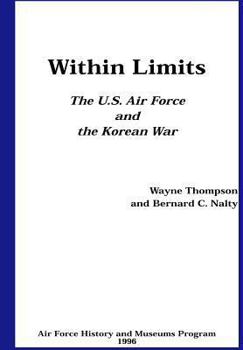Within Limits: The U.S. Air Force and the Korean War
Select Format
Select Condition 
Book Overview
Despite American success in preventing the conquest of South Korea by communist North Korea, the Korean War of 1950-1953 did not satisfy Americans who expected the kind of total victory that they had... This description may be from another edition of this product.
Format:Paperback
Language:English
ISBN:1475275528
ISBN13:9781475275520
Release Date:April 2012
Publisher:Createspace Independent Publishing Platform
Length:56 Pages
Weight:0.23 lbs.
Dimensions:0.1" x 6.7" x 9.6"
Related Subjects
HistoryCustomer Reviews
1 rating
Despite occasional overstepping, reasonably balanced
Published by Thriftbooks.com User , 18 years ago
The Korean War is one that is often forgotten and when mentioned, the comments about it are often incorrect. This pamphlet is about how the United States used air power in the Korean War and as the title implies, much is said about how it was not used. While the Korean War was not the first one fought by America with limited objectives, the war against the British in 1812 fills that role, observers lacking a historical perspective often claim that it was. The use of American air power in Korea is one more instance of the often forgotten fact about air power. "Unless you use nuclear weapons to utterly annihilate an area, aerial bombardment alone is not enough to force a nation to surrender." As is mentioned in this book, very early in the war General Douglas MacArthur stated that American air power would be enough to defeat the North Koreans. This of course was false, although it is arguably true that the massive use of air power prevented the United Nations forces from being expelled from the Korean peninsula by the initial North Korean offensive. Despite the occasional arguments that the political limits placed on the U. S. Air Force damaged the United Nations war effort in Korea, this pamphlet is reasonably balanced. In the final analysis, the death of Soviet leader Joseph Stalin probably had more to do with the end of the Korean War than anything done by any western leader. While Eisenhower made it clear to the Chinese that he was willing to use nuclear weapons in Korea, there is little indication that Stalin was moved by that fact. Any targets struck by American nuclear weapons would have been in Korea and China and Stalin would have been happy to use that as a propaganda weapon. The deaths of millions of Chinese or Koreans would have meant nothing to him. Finally, one of the best points made in this book is the major failure of the American Air Force in the Korean War. The Chinese were able to move hundreds of thousands of troops into Korea undetected by aerial surveillance. Had these movements been detected, many of the major mistakes made by United Nations commanders would have been avoided. Unfortunately, it is most unlikely that the outcome would have been different.





